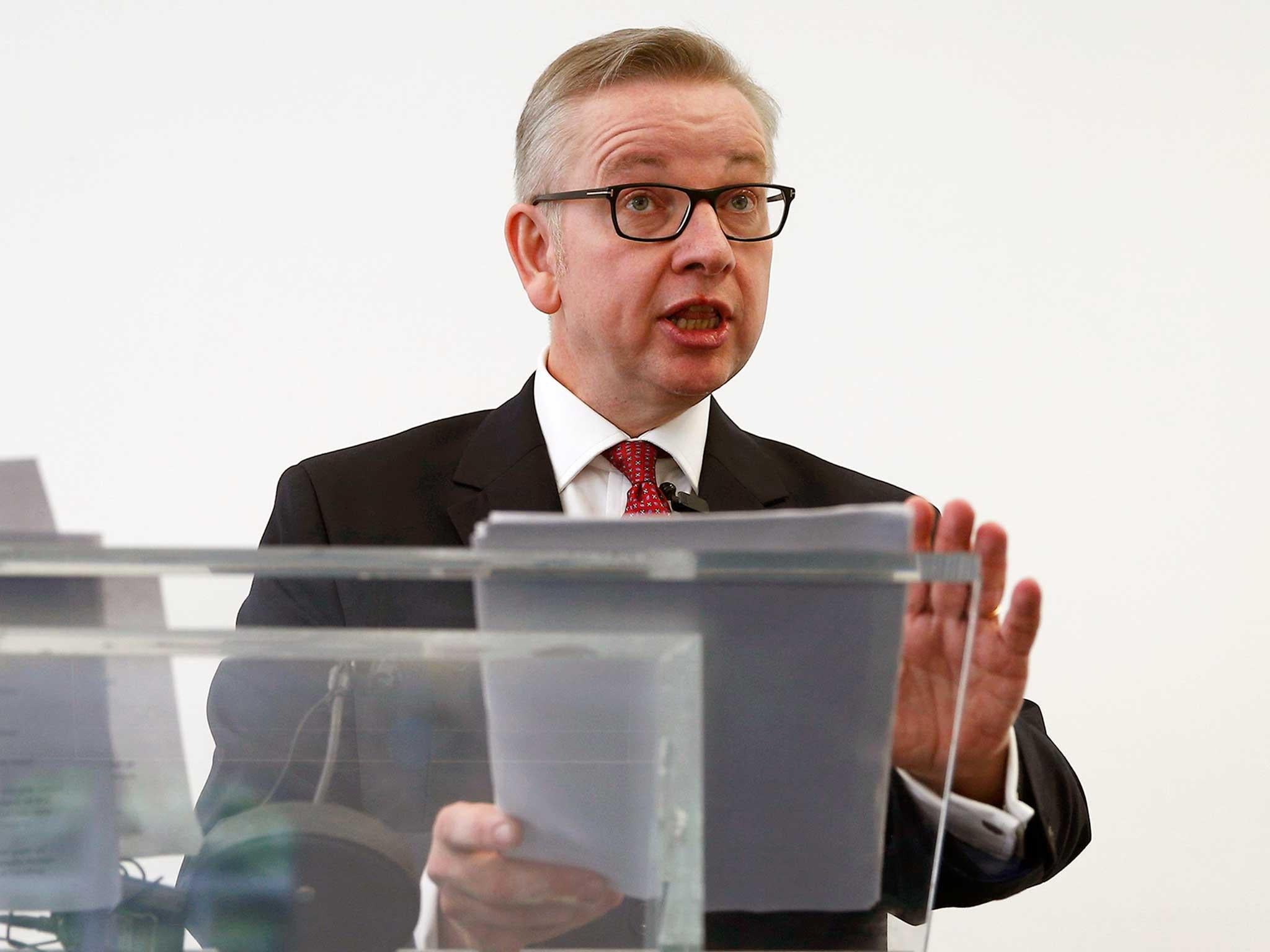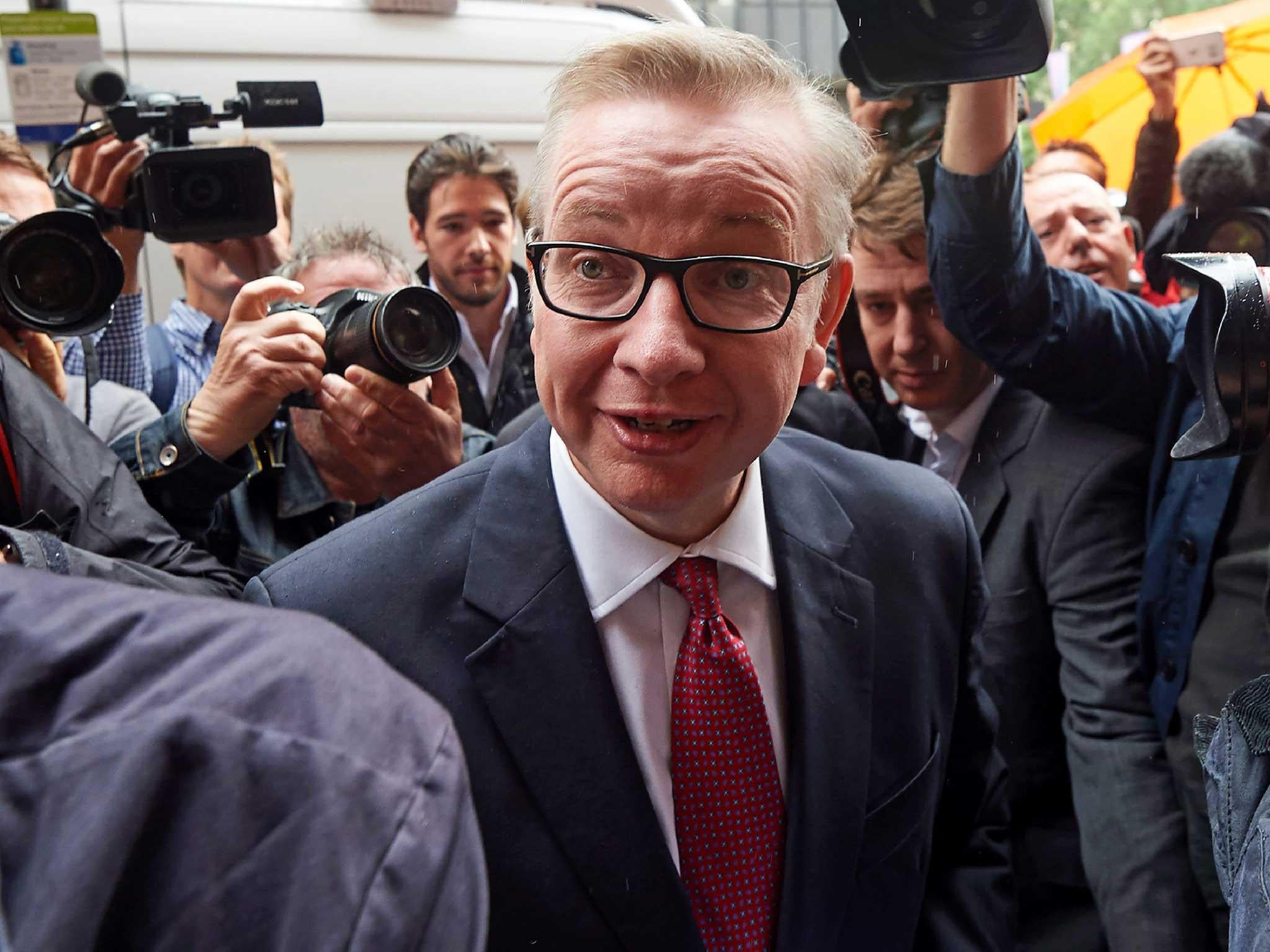Conservative leadership: Michael Gove launches bid to be next Prime Minister as 'candidate of change'
'Whatever charisma is I don't have it,' would-be leader admits

Michael Gove pledged a hard line on immigration and “radical” action on executive pay and tax avoidance, as he portrayed himself as the "change" candidate in the race to be the next Prime Minister.
Setting out a populist agenda, the Justice Secretary insisted he had never wanted to lead the country but had decided to stand to enable Britain to “embrace the opportunity” of leaving the EU.
In a direct challenge to frontrunner Theresa May, he said that the next Prime Minister should be someone who backed Brexit, and made a reforming pitch diametrically opposed to the Home Secretary’s pledge to be a steady and secure leader.

Addressing his decision to knife his Vote Leave ally Boris Johnson, whose now-aborted leadership campaign he had supported as recently as Wednesday night, Mr Gove reiterated that he had become convinced the ex-London mayor was not the right person to “build and lead” a team in government.
In a speech in Westminster on Friday, which stretched to more than hour, Mr Gove also committed himself to Vote Leave’s campaign pledges to end freedom of movement and bring down immigration numbers.
“I will end free movement, introduce an Australian-style points-based system for immigration, and bring numbers down. With my leadership, it will be delivered,“ the Justice Secretary said.
However, he failed to outline a model for Britain’s new relationship with the EU and the single market, and insisted that Article 50, the formal mechanism for withdrawing from the EU, need not be invoked this year.
Claiming that last week’s Brexit vote would not hit “national prosperity” he promised £100m a week in extra spending for the NHS and a new wave of house-building. However, his optimistic projections suffered a blow as Chancellor George Osborne announced, while Mr Gove was speaking, that he was abandoning the Government’s flagship target to be in financial surplus by 2020, warning that the referendum was expected to produce “a significant economic shock” for the country.
However, Mr Gove insisted that the Brexit vote was an opportunity for reform.
Calling on Britain to show “radicalism and ambition”, he said: “The referendum showed in stark relief that there are two Britains: those who can reap the benefits of globalisation and those who are flotsam and jetsam in its powerful flows of global capital and free labour,” he said.
“For millions, the dream of home ownership is receding and wages are stagnating. For millions of our fellow citizens this is not a brave new world but an uncertain new world.
“And for all Britain’s power and prosperity, for millions, far too many, this is still not a land of opportunity. This is still a country where your schooling, your postcode, your background matters far too much - and it is the passion of my life and the motivation of my leadership bid to change that for good.”
Committing to bring immigration numbers down and introduce an Australian-style points system, Mr Gove nevertheless declined to commit to the tens of thousands target that was in the Conservatives’ 2015 manifesto.
He also railed against soaring executive salaries and tax avoidance, pledging to reform capitalism to give shareholders more control of how companies operate.
Having repeatedly insisted he did not want and was not qualified to be PM, Mr Gove explained why he changed his mind.
"I am running in this leadership contest for one reason - and one reason alone," he said.
"I want this country I love - and which has given me so much - to embrace this opportunity for change with optimism and conviction.
"I never thought I'd ever be in this position.
"I did not want it, indeed I did almost everything not be a candidate for the leadership of this party.
"I was so very reluctant because I know my limitations. Whatever charisma is I don't have it, whatever glamour may be I don't think anyone could ever associate me with it."
Mr Gove ruled out a snap general election if he became Prime Minister and said that his former aide and Vote Leave campaign manager Dominic Cummings, who had been rumoured to be a source of division between Mr Gove and Mr Johnson, would not have a job in Downing Street if he became leader.
The five Conservative leadership contenders – Mrs May, Mr Gove, Andrea Leadsom, Liam Fox and Stephen Crabb - now have until Tuesday before facing a vote among the party’s 329 MPs. The candidate with the fewest votes is eliminated in the first round of voting, and the process repeated until only two remain, at which point the contest is opened up to a vote among the full Conservative membership, with a winner announced on 9 September.
Join our commenting forum
Join thought-provoking conversations, follow other Independent readers and see their replies
Comments
Bookmark popover
Removed from bookmarks